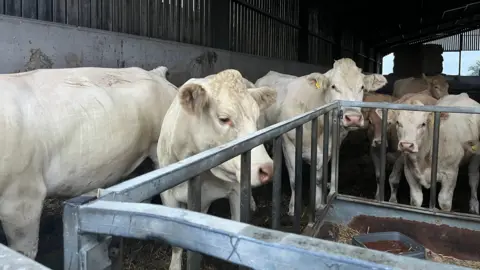Bluetongue restrictions extended in England
 Tom Jackson/BBC
Tom Jackson/BBCA restriction zone on the movement of animals has been extended after another positive case of the bluetongue virus was identified.
Farmers across West Northamptonshire must adhere to the guidelines to limit the spread of the disease.
The restrictions were already introduced for North Northamptonshire earlier this month, after positive cases along the Lincolnshire and Nottinghamshire border.
The latest infection was identified in neighbouring Buckinghamshire, and the restrictions now apply to the entirety of the East of England, the South East and much of the East Midlands.
"We understand that this is a concerning time for our farmers," said Matt Golby, the Conservative deputy leader at the council.
"But these restrictions have been put in place by the Animal and Plant Health Agency (APHA) to prevent further cases and halt the spread of this infectious disease."
Spotting symptoms
The Department for Environment, Food and Rural Affairs (Defra) said bluetongue, which can cause infertility and breathing problems in some animals, including cattle, sheep and llamas, does not affect people or food safety.
The virus is spread by the bites of midges that are often blown over from the continent during spells of warm weather.
Symptoms in affected animals can vary but often include fever, lesions, and redness around the mouth, eyes, or hooves, as well as excessive salivation and nasal discharge.
In some cases, animals may show few or no symptoms.
The disease was first detected in Suffolk on 26 August.
Defra's interactive map, available on its website, allows farmers and residents to check if they are within the restriction zone.
The zone was widened to include West Northamptonshire on Friday, after a positive case detected in neighbouring Buckinghamshire.
West Northamptonshire Council notified the public of the changes on Wednesday.
Follow Northamptonshire news on BBC Sounds, Facebook, Instagram and X.
